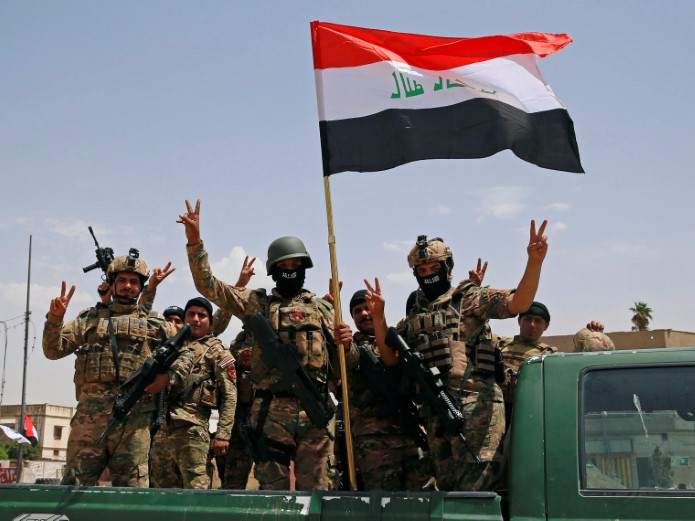Anyone who defeats ISIS has the right to celebrate. This dangerous organization is an existential threat that can’t be tamed or lived with. The choice is clear: you either eradicate it or it eradicates you.
ISIS surfaced with a hurricane of blood, mud, and darkness. It tore maps and destroyed cities near or far.
Swiftly, ISIS topped the list of threatening dangers. Destroying it became a national, regional, international and humanitarian need.
Defeating ISIS became inevitable, especially as it inhabited a well-known location.
Those who underestimate ISIS or defeating it are mistaken. Also, wrong are those who believe that the terrorist organization is the only problem and its military defeat will make it easy to return to life before its existence.
This is not a storm that blew into a city and it suffices to fix the windows after it subsided. This is an unprecedented hurricane. It blew into our region, killing, destroying and enslaving until erasing the Iraqi-Syrian border. It then began expanding in every direction.
It is a mistake as well to blame ISIS for all the piling dead bodies. Surely, it was the worst murderer whether it killed or gave others the reasons to take it too far.
There is no need for numbers and statistics.
We are talking about hundreds of thousands of deaths and millions of refugees and displaced citizens of several wars that mixed with ISIS’ wars.
Losses are estimated to be in hundreds of millions and a similar amount will be needed for reconstruction.
We stand before a large number of orphans, widows, and handicapped.
ISIS killed who it claimed it was avenging and it granted an even larger legitimacy for those who claimed they were fighting it.
ISIS’ defeaters have the right to celebrate. But at the same time, it is their duty to remember that fighters couldn’t have exploited a country unless its nationalism was deeply fractured.
This obscurant organization couldn’t have found refuge if there weren’t marginalized groups so desperate, that they would work with the devil.
Roaming fighters can’t violate a natural state that welcomes all its components with a just constitution and legitimate normal institutions.
Terrorism can seep into a strong state and disturb its security, but it can’t create safe havens and training camps to recruit new generations of suicide bombers and killers.
Takfirist ideology can’t reside in any country unless it is going through a crisis and its components are exchanging hatred waiting for a chance to attack one another.
To make things clearer, we can pose the question of whether ISIS would have been able to control Mosul in Iraq if the Shiite-Sunni relations had been normal and the partnership had been secured on basis of nationalism.
Could the army have surrendered to ISIS this quickly had it felt that residents of the city were also against the attackers?
There is a great difference between winning a battle against a terrorist organization and defeating terrorism.
Great victory means setting the foundations for stability and that is achieved through a modern state; that is, a country of national partnership, institutions and equality.
Luckily for Iraq, the army that was affected by Mosul’s falling under ISIS’ control, managed due to the enormous sacrifices, to eradicate ISIS from Mosul and is now heading towards defeating it in Tal Afar.
Iraq must have a strong army even if other forces helped in combating ISIS. The terrorist organization couldn’t have been able to do what it did on Iraqi territories had the Iraqi politicians took the battle of building a state after the toppling of Saddam Hussein’s regime.
This is a decade lost in Iraq’s history that ended in falling into ISIS’ trap.
Despite its numerous lessons, we should leave the past behind. Iraq received international and regional support in its war on ISIS.
I once asked a source involved in the war, he informed me that it would have lasted for years hadn’t it been for the US raids.
Today, we are required to invest this international and regional support and Arab sympathy and convert the victory into a chance for stability.
The only solution is to return to the state and leave behind old methods of revenge and settling the scores.
Iraq won’t be able to cross over into the desired stability unless the majority considered the national partnership that dictates full respect of Sunnis rights, aside from the politics of assigning Sunni representatives who are neither respected in their towns nor their areas.
The Sunni component should be realistic enough to turn the page and let go of the past.
To be able to move from victory to stability, one must face the questions that surfaced when the now-receding hurricane blew our way.
Iraq is to face another milestone in September: the independence referendum of Kurdistan region. I for one believe that Kurds will choose to remain within the Iraqi map if they received their rights, freedom and enough reassurances.
If Haidar al-Abadi played the exceptional role of creating the circumstances that enabled defeating ISIS, avoiding separation with Kurdistan is worth another shot. Success is only guaranteed if Abadi is fully authorized to offer Kurds anything that convinces them their future is better guaranteed as they remain part of Iraq rather than separating from it.
Military victory is not enough. There must be a project to ensure stability and stability won’t have a chance without a battle for a modern, fair state.
Any other thing being said will waste people’s sacrifices and might open the door for a hurricane to blow.
A stable Iraq is an Iraqi, Arab, and international need.
It pains Arabs to see Baghdad wounded or broken.
